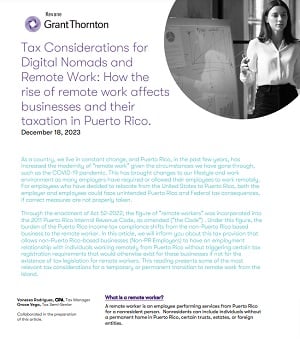-
Financial statements audits
Financial statement audits
-
Compliance audits
Compliance audits
-
Compilations and reviews
Compilations and audit
-
Agreed-upon procedures
Agreed-upon procedures
-
Corporate and business tax
Our trusted teams can prepare corporate tax files and ruling requests, support you with deferrals, accounting procedures and legitimate tax benefits.
-
International tax
Our teams have in-depth knowledge of the relationship between domestic and international tax laws.
-
Tax compliance
Business Tax
-
Global mobility services
Through our global organisation of member firms, we support both companies and individuals, providing insightful solutions to minimise the tax burden for both parties.
-
Sales and use tax and indirect taxes
SUT/ VAT & indirect taxes
-
Tax incentives program
Tax incentives program
-
Transfer Pricing Study
The laws surrounding transfer pricing are becoming ever more complex, as tax affairs of multinational companies are facing scrutiny from media, regulators and the public

-
Business consulting
Our business consulting services can help you improve your operational performance and productivity, adding value throughout your growth life cycle.
-
Business Risk Advisory
Risk is inevitable but manageable. We deliver relevant, timely and practical advices to aid organizations manage risk and improve business performance. We can help you identify, understand and manage potential risks to safeguard your business and comply with regulatory requirements.
-
Technology Advisory
We provide comprehensive solutions to safeguard your business and ensure operational resilience and compliance. Our expert team offers a range of technology advisory services designed to address your cybersecurity needs, enhance business continuity, and manage security effectively.
-
Transactional advisory services
Transactions are significant events in the life of a business – a successful deal that can have a lasting impact on the future shape of the organizations involved. Because the stakes are high for both buyers and sellers, experience, determination and pragmatism are required to bring deals safely through to conclusion.
-
Forensic and investigative services
At Grant Thornton, we have a wealth of knowledge in forensic services and can support you with issues such as dispute resolution, fraud and insurance claims.


As a country, we live in constant change, and Puerto Rico, in the past few years, has increased the modernity of “remote work” given the circumstances we have gone through, such as the COVID-19 pandemic. This has brought changes to our lifestyle and work environment as many employers have required or allowed their employees to work remotely. For employees who have decided to relocate from the United States to Puerto Rico, both the employer and employees could face unintended Puerto Rico and Federal tax consequences, if correct measures are not properly taken.
Through the enactment of Act 52-2022, the figure of “remote workers” was incorporated into the 2011 Puerto Rico Internal Revenue Code, as amended (“the Code”) . Under this figure, the burden of the Puerto Rico income tax compliance shifts from the non-Puerto Rico based business to the remote worker. In this article, we will inform you about this tax provision that allows non-Puerto Rico-based businesses (Non-PR Employers) to have an employment relationship with individuals working remotely from Puerto Rico without triggering certain tax registration requirements that would otherwise exist for these businesses if not for the existence of tax legislation for remote workers. This reading presents some of the most relevant tax considerations for a temporary or permanent transition to remote work from the Island.
What is a remote worker?
A remote worker is an employee performing services from Puerto Rico for a nonresident person. Nonresidents can include individuals without a permanent home in Puerto Rico, certain trusts, estates, or foreign entities.
Industries or businesses with remote workers in Puerto Rico
For the services of a remote worker to qualify under these rules, the Non-PR Employer must meet the following conditions:
X Must not have an office or a fixed business location in Puerto Rico during the tax year.
X Must not have economic ties to Puerto Rico.
X Must not be considered a merchant for sales and use tax purposes in Puerto Rico.
X Cannot have the remote worker as its officer, director, or majority shareholder.
✓ Services must benefit customers with no nexus with Puerto Rico.
✓ Must report the income paid to the remote worker on a Federal W-2 Form or on a Form 499R-2/W-2PR.
Economic link with Puerto Rico
The mere fact that a Non-PR Employer allows its employees to work remotely from Puerto Rico does not establish an economic link or is considered as deemed engaged in trade or business with the territory, even in situations where:
(1) The employee's home office is required for their employment.
(2) There is a valid business reason for allowing the employee to use their home as an office.
(3) The employee is required to perform some basic work duties from the employer's premises.
(4) The employer may reimburse the employee for some of the expenses incurred in maintaining a home office.
Withholding of tax at source on wages
Non-PR Employers do not need to withhold or report taxes on wages paid to remote workers after December 31, 2021.
Requirement to pay estimated tax
On the other hand, remote workers are responsible for paying estimated taxes on income earned from Non-PR Employers after December 31, 2021.
Credit for taxes paid to possessions or states of the United States
A remote worker could claim in his income tax return a foreign tax credit for taxes paid or accrued to any possession or any state of the United States during the tax year for services rendered to a Non-PR Employer that comply with the provisions. The credit will only apply to the amount of taxes paid to states and territories of the United States whose source of income rule, in the case of wages, is based on the employer’s residence or place where the employer conducts business.
How does remote work affect businesses in Puerto Rico?
While the impact of these measures that promote remote work in Puerto Rico remains uncertain, its adoption has accelerated significantly since the COVID pandemic. These changes expand opportunities for Puerto Ricans to get remote jobs from industries with no presence in Puerto Rico and empower employers to hire and allow employees residing on the island to work remotely without triggering tax implications or being considered engaged in trade or business within Puerto Rico. This positions Puerto Rico as a destination for both temporary and permanent remote work arrangements that allow the development and continuity of employment despite any circumstance that occurs in the country.
Prior to this law amendment, U.S.-based companies could not have employees working remotely from Puerto Rico, other than to work as a freelancer, subcontractor, or self-employed, without triggering to be devoted to a trade or business in Puerto Rico. It is important to note that these amendments appear to be aimed at making it easier for remote workers to relocate to Puerto Rico without causing income tax filing requirements for their nonresident employers. Please be advised that the PRTD may issue technical amendments during the process.
The new tax law is a positive development, but it is not a complete solution. The law only addresses income taxes, and it does not necessarily exempt Non-PR Employers from registering or complying with other types of taxes, such as state department requirements, state unemployment insurance corporations, and labor legislation. We perceive this change can lure Non-PR Employers hiring remote workers to consider Puerto Rico as a business destination and assess opportunities under the Incentives Code. For further information on available incentives in our Island, access our tax and incentives guide: Puerto Rico tax and incentives guide | Grant Thornton
We are committed to keeping you informed of all the latest developments in laws and regulations that affect businesses in Puerto Rico. We can help you navigate the complex tax landscape to ensure that you are taking advantage of all the available benefits. Contact us today to learn more about how we can help you.
ACKNOWLEDGMENT: This article was prepared in collaboration with Grace Vega, Tax Semi-Senior.
DISCLAIMER: This update and its content do not constitute advice. Clients should not act solely on the basis of the material contained in this publication. It is intended for information purposes only and should not be regarded as specific advice. In addition, advice from proper consultant should be obtained prior to taking action on any issue dealt with this update. Information provided in this publication may change in the future and such change may be applied retroactively. Kevane Grant Thornton LLP does not assume the responsibility to update this communication if the applicable laws change.
© 2023 Kevane Grant Thornton LLP All rights reserved. Kevane Grant Thornton LLP is a member firm of Grant Thornton International Ltd (GTIL). GTIL and the member firms are not a worldwide partnership. Services are delivered by the member firms. GTIL and its member firms are not agents of, and do not obligate, one another and are not liable for one another’s acts or omissions. Please visit www.grantthornton.pr for further details.


